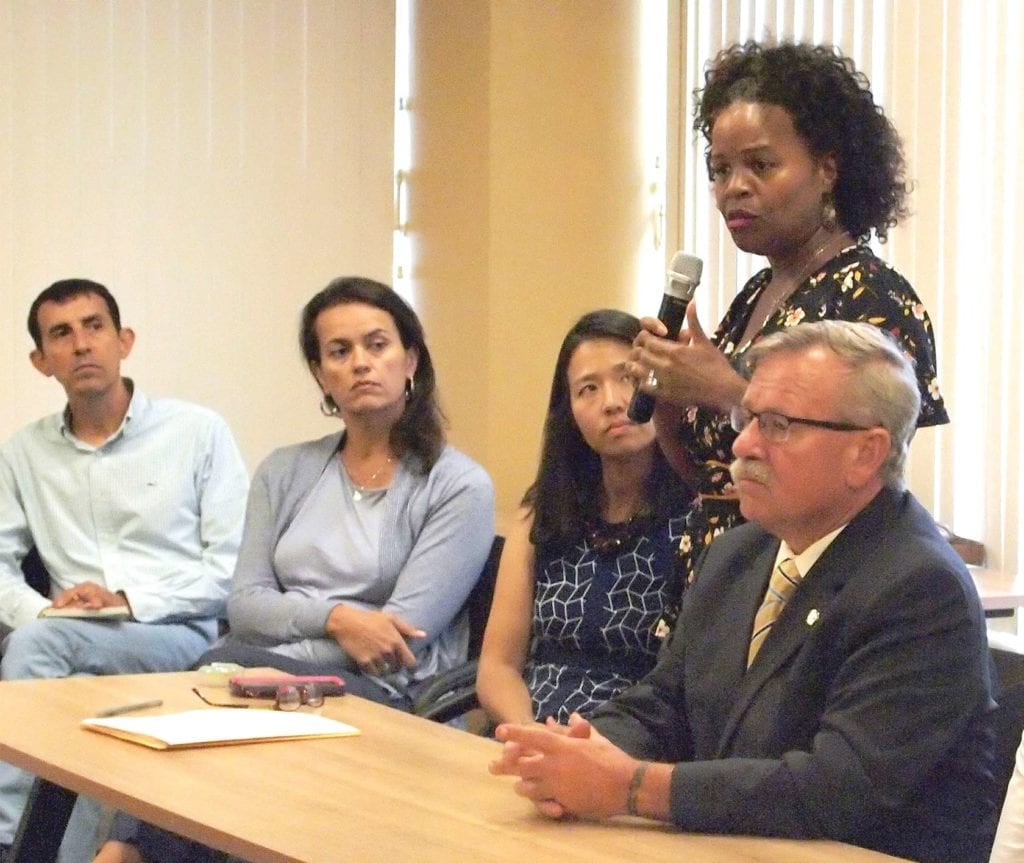Roxbury residents discuss opioid crisis response
City officials discuss efforts to stem crime, provide help

Forced from their hangouts at Massachusetts Avenue and Melnea Cass Boulevard by police sweeps, drug users have moved deeper into residential neighborhoods, ratcheting up tensions in the South End and Roxbury.
Last Wednesday, city officials, police officers and elected officials met with Roxbury residents at the Central Boston Elder Services building in Dudley Square to discuss the short- and long-term plans for dealing with the population of homeless and drug-addicted people in Boston.
At the meeting, police officials said they would make arrests when necessary to protect the safety of residents. City officials said they are working to expand recovery services for the population in the area. Neighborhood residents expressed sentiments ranging from frustration with the addicts’ behavior, discarded needles and prostitution, to concerns that police are violating the rights of people living on the streets.
BPD Deputy Superintendent Michael Stratton said the department’s Operation Clean Sweep, which saw officers flood the area around the South Bay jail and make dozens of arrests beginning Aug. 1 had been in the works for weeks and was not launched directly in response to the beating of a prison guard by homeless people the day before.
“It just expedited what we were already going to do,” Stratton said.
Marty Martinez, the city’s chief of Health and Human Services, said the city is working to reopen the Long Island shelter, where treatment services were available before it closed in 2014 when the Long Island Bridge was deemed unsafe. Martinez said the city is seeking permitting from the city of Quincy and the state.
“As soon as we get through the legal process, we’re ready to go,” he said.
The construction process, which would involve building the bridge in Boston and floating it by barge to Quincy, will take two or three years, he added.
In the meantime, the city and nonprofit organizations are continuing to provide services in the area around Boston Medical Center, Massachusetts Avenue, Melnea Cass Boulevard and South Bay — a strategy that in recent years has earned the area the nickname “Methadone Mile.”
As the opioid crisis has gripped the New England region, Boston has become a magnet for people seeking recovery services and for those seeking easy access to heroin. While Walsh told the Banner the city welcomes people from other towns seeking services, last week he and Police Commissioner Willie Gross told the Boston Globe other cities and towns need to do more to respond to the crisis. Of the 34 people arrested during the recent police operations in the area, 21 were from cities and towns outside of Boston.
City officials came under fire during the sweeps when wheelchairs police had taken from people in the area were photographed in the back of a garbage truck. While most of those arrested were collared for outstanding warrants, critics of the operation said the city can’t arrest its way out of the opioid crisis.
During last week’s meeting, some neighborhood residents expressed support for an increased police presence in neighborhoods where the addicts are congregating. South End resident David Harris said prostitution has become rampant at a bus stop on Massachusetts Avenue near his home.
“It’s out of control,” he said. “The johns come there, the money is there and that brings out the drug dealers.”
Davis asked that a police detail be stationed at the stop.
Stratton described police efforts to combat prostitution and drug dealing at the bus stop. Prior to a sting operation, he said, officers met with the women engaging in prostitution.
“We actually told them what we were going to do,” he said. “A few weeks later, we went in and we locked up a handful of women. They were offered services to help deal with addiction and homelessness. Seventy-five percent went into services. A few of them didn’t want to. They went to jail.”
In a subsequent sting, police officers posed as prostitutes and arrested johns, Stratton said.
Domingos DaRosa, who coaches a youth football league at nearby Clifford Park, said children are still being exposed to people overdosing, shooting up and engaging in prostitution. He questioned the timing of the recent sweep.
“Now that a corrections officer was beat up, there’s a response,” he said.
Former Orchard Gardens K-8 student Jay’dha Rackard spoke about the fear she and other students experience walking to school.
“Now that my life has been disrupted, what are you going to do for my community?” she said. “Why doesn’t my life matter?”
Martinez responded.
“There’s no questioned that you shouldn’t have experienced what you experienced,” he said.
Martinez said the city’s Mobile Sharps Team, tasked with collecting discarded needles placed in kiosks and discarded on the ground, collects 14,000 needles a week.
“When you have 14,000 needles, it’s an epidemic,” he said.







